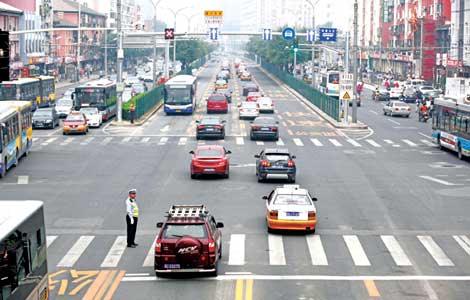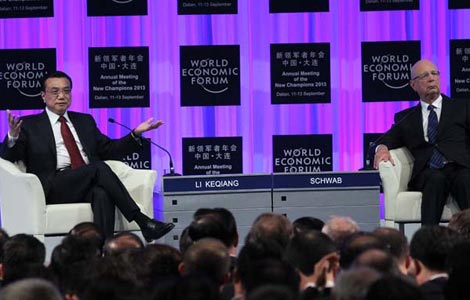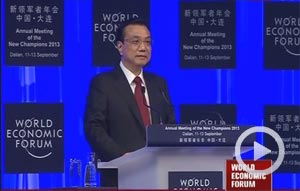Premier stresses transformation of the economy
Updated: 2013-09-12 02:01
By DING QINGFEN in Dalian, CHEN JIA in Beijing and FU JING in Brussels (China Daily)
|
||||||||
Liu Yuanchun, associate dean of the School of Economics at Renmin University of China in Beijing, said the premier's speech signals his determination to deepen structural reform.
"The policy stance of Premier Li has been consistent, emphasizing restructuring, promoting transformation and stabilizing growth," Liu said.
"This is the right choice, when compared with stimulus investment or easing monetary policy."
Wang Tao, chief economist in China at UBS, said the nation should not worry about short-term growth, as the rebound will continue. She forecast that the economy will grow by 7.6 percent this year.
In August, industrial output grew at its fastest pace for 17 months at 10.4 percent from a year earlier, compared with 9.7 percent in July.
Fixed-asset investment accelerated to a 20.3 percent expansion year-on-year in the first eight months compared with 20.1 percent from January to July.
Retail sales of consumer goods grew by 13.4 percent from a year earlier, up from 13.2 percent in July, reaching the highest level since March, the National Bureau of Statistics said.
Together with improvements in exports and the manufacturing Purchasing Mangers' Index, all macroeconomic data have confirmed China's economic growth has picked up solidly, economists said.
"More growth potential will be released through urbanization and industrialization," Wang from UBS said. "But in the long run, the government will face pressure from production overcapacity and the increase in non-performing loans."
Nancy McKinstry, chief executive officer of Wolters Kluwer in the Netherlands, a publisher and global information services company, said the driving forces behind China's long-term growth will come from several areas.
She said the government has decided to focus on upgrading industries and moving beyond manufacturing by boosting the role of consumption and the service industry, which will release "tremendous" opportunities.
She also said that due to urbanization, China will see 300 million more people moving into cities in the next 20 years, driving domestic demand across a broad spectrum of industries.
"We are encouraged that the leadership is cutting down on red tape and making business easier," McKinstry said, adding that this practice, such as scrapping taxation on small businesses, will help promote entrepreneurship and growth.
Jonathan Holslag, a professor of International Politics at Vrije Universiteit Brussel and a fellow at the Brussels Institute of Contemporary China Studies, said Li has reiterated on different occasions that the current growth pattern is unsustainable and that rebalancing is key.
"Rebalancing from investment to consumption is an endeavor in the long run, after the process of industrialization is accomplished," Holslag said.
Contact the writers at dingqingfen@chinadaily.com.cn and chenjia1@chinadaily.com.cn

 Plenty of fizz
Plenty of fizz
 Traffic about-face seeks to ease congestion
Traffic about-face seeks to ease congestion
 Another iPhone4 explodes while charging
Another iPhone4 explodes while charging
 Premier stresses transformation of the economy
Premier stresses transformation of the economy
 Soyuz capsule returns from space station
Soyuz capsule returns from space station
 China's Christian churches reduce leaders' age ceiling
China's Christian churches reduce leaders' age ceiling
 Student's rare blood bonds Kazakhstan and China
Student's rare blood bonds Kazakhstan and China
 Apple's low-end phone price disappointing
Apple's low-end phone price disappointing
Most Viewed
Editor's Picks

|

|

|

|

|

|
Today's Top News
US moves against China firms criticized
3 sentenced to death for Xinjiang terror attack
Xi welcomes talks on Iran
Assad agrees to hand over chemical weapons
Time of opportunities, challenges
China sets caps for rare earths exploration
Ending non-tariff barriers benefits global economy
Developing nations need shift to balanced growth
US Weekly

|

|






